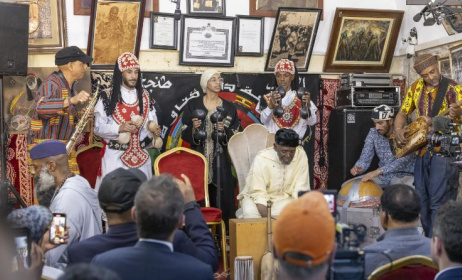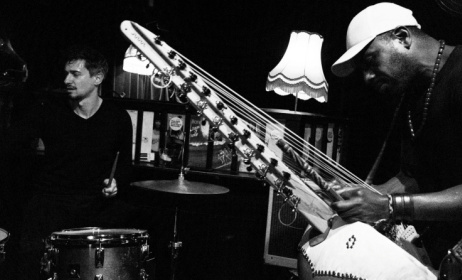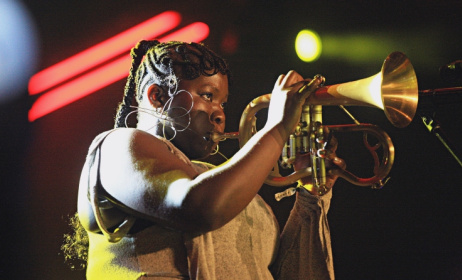Jazz in Sudan
The beginning of modern music in Sudan, including Sudanese jazz, dates back to the 1920s, with one of its earliest forms known as haqeeba, which loosely translates as ‘briefcase’. The name is thought to have been derived from Mohammad Ahmad Salih’s show on Radio Omdurman. Salih was a historian and music collector who played acoustic songs on a show titled Haqeebat Alfan (suitcase of art).
 Mohamed Araki playing with Bombino on KEXP.
Mohamed Araki playing with Bombino on KEXP.
Haqeeba is rich in poetry. A lead singer, backed by a choir, performs with percussive sounds from tambourine-like instruments and tar drums that are played in the background. The musical style was popular at weddings and social gatherings. Haqeeba is regarded as one of the most authentic music forms in Sudan and bears minimal influences from the outside world, although it was weaved into foreign genres when musicians began to play western instruments in the 1940s. It was greatly popularised by singers like Abdel Karim Karouma, Mohamed Wad al-Faki and Mohammed Ahmed Saror [1].
Influence of madeeh
Though Abdel Karim’s lyrics were wholly secular, his songs were heavily influenced by Islamic recitations known as madeeh, which include admirations, glorifications and dances in honour of the Prophet Muhammad. Madeeh is still practised by members of the Sufi community in the Omdurman region, who meet weekly to pray and dance, and often reach a trance-like state through it [2].
Post-Haqeeba era
From the 1940s, western instruments became increasingly popular in Sudanese music as elements of ‘jazz’ began to be noticeable. Quite different from American jazz styles like bebop, the Sudanese version was a combination of the blues, pop, surf, funk, rock & roll, Congolese music and East African harmonies. Popular artists from this era include Ismail Abdul Mu'ain, Hassan Attia, Ahmed al-Mustafa and Ibrahim al-Kashif, also known as ‘the Father of Modern Singing in Sudan’.
Live performances took root at the Gordon Music Hall in Khartoum [3]. The venue was British-owned and only accessible to a select few. In the 1960s and 1970s, during the ‘Golden Era of Sudanese Music’, St James Music Hall became the most important music venue in the city.
When Sudanese musicians began employing Western instruments, the public labelled the new sound as ‘jazz’, although to western ears this categorisation may be seen as somewhat misguided. Nonetheless, this led to the formation of bands like Adwaa Bahri (Bahri Lights), Al Agarib (The Scorpions) and Al Ruhal (The Nomads) [4].
King of Sudanese Jazz
Sharhabil Ahmed, also known as ‘The King of Sudanese Jazz’, fused haqeeba with styles and rhythms like rock & roll, and added brass instruments and the guitar to his compositions.
Together with fellow musicians such as Ali Nur Elgalil, Farghali Rahman, Kamal Hussain, Mahaddi Ali and Hassan Sirougy, Sharhabil Ahmed performed locally and internationally until the late 2010s. He and his colleagues are credited for inspiring bands such as The Blue Stars, The Scorpions, The Aldiyum Band and Al-Agarib, which further popularised Sudanese jazz locally and internationally.
Sharhabil performed at local events, state functions, and internationally. As the music and scene thrived, he later formed the Jazz Union, the country’s first musicians’ organisation bringing together local jazz acts [4].
In 2020, German record label Habibi Funk released a seven-track compilation titled The King of Sudanese Jazz in Sharhabil’s honour. The offering comes with interviews, liner notes and photographs from the musician’s long career in music [5].
Sharhabil's wife, Zakia Abul Gassim Abu Bakr, contributed to his music by playing the oud and later began playing the guitar, cementing her place as the first Sudanese woman to play the instrument live [6]. The couple became a spectacle and earned the band several invitations to perform in cities like Cairo, Alexandria, Asmara, London, Amsterdam, Paris and Berlin. Zakia also formed an all-women jazz band called Sawa-Sawa.
Contemporary artists
The imposition of sharia law in 1983 generally affected music production and live performances in Sudan. But many artists kept the Sudanese musical spirit alive and continued to create music at home and in the diaspora.
Below are notable names in the Sudanese jazz scene:
Mohamed Araki
Keyboardist Mohamed Araki’s name is etched in Sudanese history as the first artist to be nominated for a Grammy Award for his work with Nigerien Tuareg bandleader Bombino. His father, Abu Araki, a legendary singer from the Golden Era of Sudanese Music, encouraged Mohamed to play with his band. Mohamed later went on to play with Magic Band, Amal El Noor, Taha Sleiman and Almillije. He then moved to the US where he has established himself as a leading keyboardist and producer based in Boston. In recent years he has played with Lamine Tour and Saloum, Brooklyn Nomads, Josh and The Jam Tones, Bahloul, Dead Messengers and Dean Ford & The Beautiful Ones [7].
Blue Magic Band
One of the younger brothers in the Araki family, Sibo, pursued a degree in jazz at the Jazzamba School of Music in Addis Ababa, Ethiopia. He returned to Sudan and helped many musicians by sharing his knowledge as a now accomplished jazz bassist. In addition to teaching through various music programmes in Khartoum, Sibo Araki also started the Blue Magic Band, which plays jazz standards as well as a fusion of jazz and Sudanese music. [12].
Islam Elbeiti
Media personality, bassist, performer, educator and activist Islam Abdelmoniem Elbeiti has played an active role in the promotion of jazz through her weekly radio show on Capital 91.6 FM. Through her work, she has helped to launch live events that provide performance platforms for local jazz musicians [8].
Aysa Satti
Aysa Satti, who often sings about the empowerment of women in conservative societies, is known for fusing African and Middle Eastern influences with soul and the blues. She was born in Stockholm, Sweden, to Sudanese parents, and spent her formative years travelling between Sweden, Egypt and the UK [9]. She is currently based in the UK.
Aswat Almadina
Founded in 2016, Aswat Almadina is one of the most popular bands in Sudan. The group employs a clever mix of haqeeba, pop and smatterings of smooth jazz, although most jazz aficionados will not place the band in the jazz genre per se. Through thoughtful lyrics, well-attended live concerts and using social media for social change, the band earned the National Goodwill Ambassador role for the United Nations Development Programme in 2017 [10].
Mosno al-Moseeki
Mosno al-Moseeki, a Sudanese singer and songwriter based in the US, combines a gentle blend of western and eastern musical influences with the acoustic guitar and Arab poeticism [11].
Hazim Al Shafei Quintet
Hazim al-Shafei is a vocalist and upcoming jazz musician, who is also an artistic director at Omdurman Cultural Centre, a large space reserved for art, music and cultural events. Al-Shafei and his quintet remake Sufi poetry and Sudanese classics into jazzy renditions, performing in Khartoum and other Sudanese cities. They are yet to release official music on streaming platforms [13].
Resources and citations
[1] https://500wordsmag.com/art-and-culture/special-feature-sudanese-artists-the-changing-landscape/
[2] https://www.theguardian.com/world/gallery/2016/feb/05/the-psychedelic-world-of-sudans-sufis-in-pictures
[3] https://sudaneseonline.com/board/8/msg/%D8%A7%D9%84%D8%B3%D8%B1-%D9%82%D8%AF%D9%88%D8%B1--1082722475.html
[4] https://thequietus.com/articles/29117-sharhabil-ahmed-the-king-of-sudanese-jazz-interview
[5] https://habibifunkrecords.bandcamp.com/album/habibi-funk-013-the-king-of-sudanese-jazz
[6] https://www.dabangasudan.org/en/all-news/article/interview-with-sudan-s-first-professional-female-guitarist-the-ministry-of-culture-neglects-sudanese-ar
[7] https://www.revivalhouserecords.com/mohamedbio
[8] http://500wordsmag.com/interviews/islam-elbeiti-a-jack-of-many-trades/
[9] https://asyamusic.co.uk/about/
[10] https://www.sd.undp.org/content/sudan/en/home/presscenter/pressreleases/2017/02/14/undp-appoints-music-band-aswat-almadina-goodwill-ambassadors-in-sudan.html
[11] https://bakerartist.org/file/greek-nubian-collective-artscape-2013
[12] https://m.facebook.com/story.php?story_fbid=pfbid0EfKJt6zza2a4E9Yr1tLR9j...
[13] https://m.facebook.com/AndariyaMag/videos/sama-music-festival-fishbowl-session-with-3-sudanese-artists/2994234490892162
Research Study: ‘Comparison of American and Sudanese Jazz Bands’ accessed at http://repository.sustech.edu/handle/123456789/13323
Disclaimer: Music In Africa's Overviews provide broad information about the music scenes in African countries. Music In Africa acknowledges that the information in some of these texts could become outdated with time. If you would like to provide updated information or corrections to any of our Overview texts, please contact us at info@musicinafrica.net.
Editing by Peter Choge and Kalin Pashaliev



































Comments
Log in or register to post comments